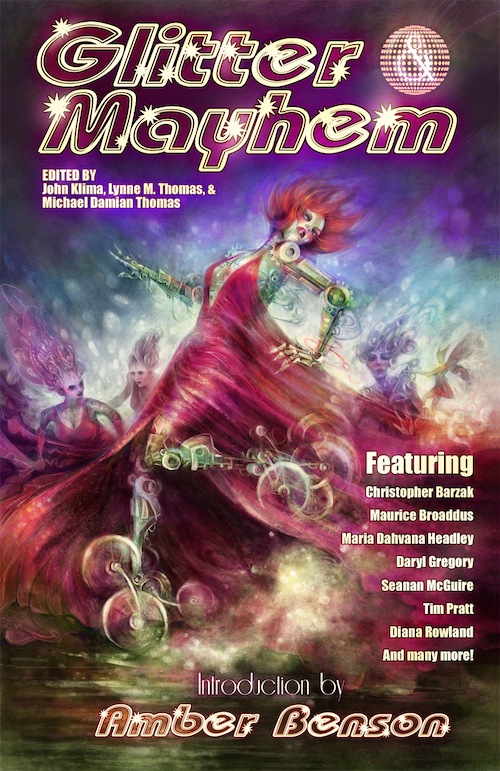Welcome back to the Short Fiction Spotlight, a space for conversation about recent and not-so-recent short stories. Last time around, I discussed the newest installment of Steve Berman’s Wilde Stories collections. In a similar vein, this week I’d like to look at a recently released short fiction anthology: Glitter & Mayhem, edited by John Klima, Lynne Thomas, and Michael Damian Thomas. This anthology—funded by a Kickstarter campaign and published by Apex—has a very particular theme, as the tagline on the back makes clear: “Welcome to Glitter & Mayhem, the most glamorous party in the multiverse.”
The stories here primarily feature roller derby, disco, parties, and a stunning number of night clubs, rendered in vivid detail by writers like Christopher Barzak, Seanan McGuire, Tansy Rayner Roberts, Maria Dahvana Headley and Amal El-Mohtar. Glitter & Mayhem cultivates a high-energy tone of risk, reward, and delight—it’s not what you’d call a serious book, though it does have its moments of darkness and contemplation. It’s also, and this should come as no real surprise based on the list of contributors, a fairly queer anthology; many of the stories herein deal with gender and/or sexuality in various forms.
There were several stories in the book that stood out to me, though for remarkably different reasons. (One of the strengths of this anthology is that when it hits a good stride, the stories mesh well without too much tonal overlap.) Perhaps my favorite of the bunch was “A Hollow Play” by Amal El-Mohtar—a story with a wrenching, intimate emotional core as well as a thoughtful exploration of embodiment, attachment, and loss. The Peri and their situation are fully realized, but the reader is never overwhelmed with extraneous detail. Additionally, the relationships between women—and the acknowledgement of the real depth and potentiality of “friendship,” often represented as more shallow than romantic love—were intense and a genuine delight to read.
Another story that deals with girls and companionship is “Bess, The Landlord’s Daughter, Goes for Drinks with the Green Girl” by Sofia Samatar. This piece has more to do with the hauntings that come from not having enough, not enough life or fair chance or experience. I appreciated that subtlety of that theme, as well as how the two ghost girls go on together and support each other as they seek some measure of fulfillment.
And then, on a totally different note: “The Electric Spanking of the War Babies” by Maurice Broaddus & Kyle S. Johnson. It’s an immensely fun story, set in a cultural moment and playing that moment up in high style; it’s also break-neck in pace and perhaps mostly made of the surface tension that comes from that pacing. On the last hand, though, that in itself is a narrative choice, and I respect it—this story is what it is, and it’s a hyper-media-saturated experience that reminds me of some postmodern literature.
Lastly, the longest story in the book was another that had a core of great fun to it: “Bad Dream Girl” by Seanan McGuire. This story is set in an existing universe, but it reads as a functional stand-alone. It’s also the most memorable of the roller derby stories, a sort of urban-science-fantasy piece with a mystery/investigation arc. So, it fits a certain narrative style—but that doesn’t give a sense of how pleasant the narrator’s voice is, and how much energy McGuire imbues in her viewpoint. It’s catchy and amusing; certainly a hell of a time.
Otherwise, the majority of the stories in Glitter & Mayhem are entertaining and reasonable well-crafted. Their portrayals of sex, drugs, and parties are often significantly different, and that’s nice to see—the theme is not represented as some kind of monolith. Admittedly, some pieces feel like parts of larger stories—in particular, urban-fantasy romps like “Sooner than Gold” by Cory Skerry—and others focus perhaps more on the theme than the arc of their characters. These pieces remain enjoyable, but begin to blur a bit when read in quick sequence; for example, after a few roller derby stories in a row, only the best one of the bunch tends to stick with me.
I would also note that there were two stories that didn’t quite win me over: “Unable to Reach You” be Alan DeNiro and “Two Minute Warning” by Vylar Kaftan. DeNiro’s piece does not stick the landing, as endings go, and takes the route of a (fairly obvious) horror twist that doesn’t balance well against the pacing and shape of the rest of the piece; Kaftan’s is more of a snapshot than a story, and doesn’t allow for much in the way of engagement or development in its brief appearance.
However, as a whole, Glitter & Mayhem is a decent anthology of original short fiction on a playful, fun theme that—while perhaps better read in chunks than all at once—certainly entertains and holds readerly attention. The contributors are all having a good time with the stories they’ve written and that shows in the final product, which is always a pleasure; I’d say the same for the editors, and the work they’ve put into the arrangement and selection of these particular stories. I had a good time and I suspect that, if you’re at all interested in glitz, parties, and/or mayhem, you will too.
Lee Mandelo is a writer, critic, and editor whose primary fields of interest are speculative fiction and queer literature, especially when the two coincide. She can be found on Twitter or her website.










